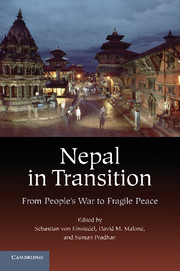Book contents
- Frontmatter
- Contents
- Contributors
- Acknowledgments
- 1 Introduction
- The Context
- Critical Transition and the Role of Outsiders
- 6 Nepal's Masala Peacemaking
- 7 A Comprehensive Peace? Lessons from Human Rights Monitoring in Nepal
- 8 The United Nations and Support to Nepal's Peace Process: The Role of the UN Mission in Nepal
- 9 The 2008 Constituent Assembly Election: Social Inclusion for Peace
- 10 Revolution by Other Means: The Transformation of Nepal's Maoists in a Time of Peace
- Regional Dynamics
- Conclusions
- Index
- References
9 - The 2008 Constituent Assembly Election: Social Inclusion for Peace
Published online by Cambridge University Press: 05 April 2012
- Frontmatter
- Contents
- Contributors
- Acknowledgments
- 1 Introduction
- The Context
- Critical Transition and the Role of Outsiders
- 6 Nepal's Masala Peacemaking
- 7 A Comprehensive Peace? Lessons from Human Rights Monitoring in Nepal
- 8 The United Nations and Support to Nepal's Peace Process: The Role of the UN Mission in Nepal
- 9 The 2008 Constituent Assembly Election: Social Inclusion for Peace
- 10 Revolution by Other Means: The Transformation of Nepal's Maoists in a Time of Peace
- Regional Dynamics
- Conclusions
- Index
- References
Summary
A Balancing Act
Electoral processes are not serving their main purpose, that of consolidating or deepening democracy, unless they are fostering a political system representative of the society and advancing human rights. The election for Nepal's long-pursued Constituent Assembly was meant to ensure such a democratic transformation and, with it, the deliverance from a decade-long conflict. In the context in which large-scale social exclusion had been the root cause of the conflict in Nepal, this chapter focuses on the opportunities and limitations for peace and state-building through electoral processes from the perspective of inclusive representation.
Two circular paradigms framed the Constituent Assembly electoral process. Holding an early election would sustain the necessary momentum for the peace process by maintaining the trust between the main parties to it, the Seven Party Alliance and the Communist Party of Nepal (Maoist) (CPN-M). At the same time, holding the election before granting the traditionally marginalized communities the freedom to elect their own representatives was prone to opening a new dimension for the conflict.
- Type
- Chapter
- Information
- Nepal in TransitionFrom People's War to Fragile Peace, pp. 232 - 264Publisher: Cambridge University PressPrint publication year: 2012
References
- 2
- Cited by



